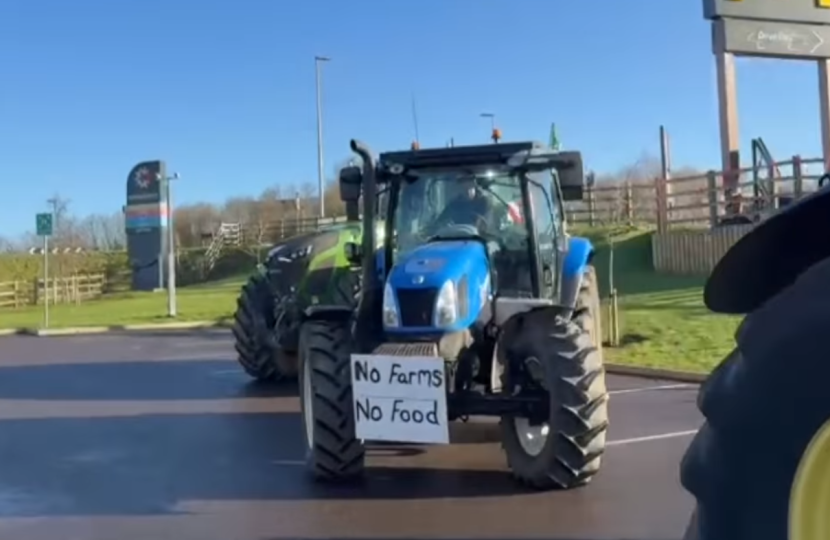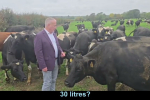
Richard has long been a champion of British farmers, who are the backbone of our nation. They produce our food, manage the countryside, support rural communities and deliver on green and animal welfare commitments. Yet, instead of supporting them, this Labour administration is putting their future at risk with its Family Farm Tax. At a time when food security and affordability are more important than ever, we should be supporting our British farmers, not undermining them.
In the Autumn Budget 2024, the Government announced it would place a tax on family farms by removing agricultural property relief (APR) from inheritance tax and introducing an inheritance tax liability on any farm valued at over £1 million.
The implications of this tax are profound. Many family farms are asset-rich but cash-poor, with modest and highly uncertain incomes. The proposed tax would force families to sell parts of their farms to pay Inheritance Tax, undermining their livelihoods and threatening the future of British agriculture. A single combine harvester alone can cost up to a million pounds (or more) - yet Labour’s new policy means that any agricultural assets above this threshold will be taxed at 20%. This equipment is essential to farming and is usually bought with a loan, meaning that interest payments and repaying the principal must come out of the farm’s profits. The Agriculture Property Relief (APR) introduced in 1984 was specifically designed to protect Britain’s family farms from being sold and broken up. It is for this reason, that governments of all colours have maintained APR - until now.
The leader of HM Opposition, Kemi Badenoch, has been clear that the Conservative Party would repeal the Family Farm Tax if re-elected to government.
The Government's removal of this safeguard forces farmers into an impossible position: either take a huge financial loss on already declining incomes (which fell by up to 60% in 2024), sell off vital assets, or stop farming altogether. The consequences for Britain’s food security, food prices and the survival of family farms will be severe.
The Government's claims that few farms will be affected are based on out-of-date figures which fail to take into account rising land values. Analysis by the National Farmers’ Union (NFU) shows that, when adjusted to the current market value of farmland and typical farm assets, 75% of commercial family farms are above the £1 million threshold.
All of the UK’s major supermarkets have publicly raised concerns over these proposed changes and the Office for Budget Responsibility (OBR) has cast doubt over whether the measure will raise the amount of tax the Chancellor claims it will. The OBR has also said these measures will disadvantage older farmers, leaving them little time to restructure their affairs.
Since the Government announced its Family Farm Tax, Richard and his colleagues in HM Opposition have been working with farmers and other stakeholders to campaign against and challenge this cruel, ideological attack on British farmers. In Parliament, as Shadow Chief Secretary to the Treasury, he has highlighted the harmful impact of this policy, including in his speech closing the Budget Debate. Beyond the Chamber, he has met regularly with farmers, both in his constituency and at national events, to hear their concerns first hand. These farms are not merely businesses; they are the lifeblood of our rural economy, passed down through generations, embodying our nation's agricultural heritage.
This tax is ideological and badly thought through. It reduces our food security, put farmers out of business, and in doing so risks raising no additional revenue. The Government's policy will break up farms generation after generation until they are no longer viable. This is a direct betrayal of farmers, who were previously assured by Labour that APR would not be changed.
In December, Richard and his colleagues in HM Opposition stood in support of our British Farmers and voted against the Government's legislation to introduce this tax. Under intense pressure, the Government yielded and snuck out a partial u-turn just before Christmas - increasing the tax threshold from £1 million to £2.5 million.
Although a win for the many thousands of campaigners who spent 14 months protesting this tax, signing petitions, and engaging with MPs, the change in direction does not go far enough. As the President of the Country Land and Business Association said, the Government's u-turn only limits the damage, it does not eradicate it. Many family farms will own enough expensive machinery to be valued above the threshold yet still operate on such narrow profit margins making the new tax burden unaffordable.
You can read more about Richard’s work on this issue below.







